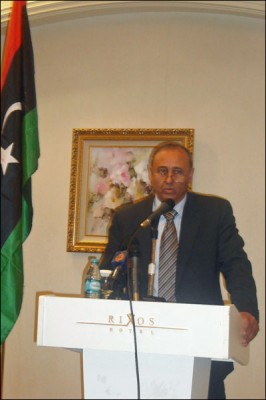Tripoli, 9 March 2012:
Preparations for the two-day regional ministerial summit on border security got under in Tripoli on Friday.
The summit, on . . .[restrict]Sunday and Monday, is a Libyan initiative and brings together interior and defence ministers from Libya, Egypt, Sudan, Mali, Niger, Chad, Mauritania, Morocco, Algeria, Tunisia, as well as representatives of the United Nations, the European Union, the Arab League and the African Union.
The aim of the gathering to draw up a strategy for regional security and prevent people and drugs smuggling and the smuggling of arms. The latter has become a serious issue regionally following the overthrow of the Qaddafi regime. Libyan arms have been turning up in large numbers in Egypt, Tunisia, Algeria and are thought to a major factor in the resurgent Tuareg rebellion in Mali.

Addressing officials from the participating countries preparing the summit, Libya’s deputy foreign minister, Mohamed Abdel Aziz, said spoke of the challenges.
“The conference will discuss security problems in the region and the challenges that are imposing themselves at this stage, including the proliferation and smuggling of weapons across the border, terrorist operations, illegal dealing in drugs, illegal immigration and smuggling of immigrants,” he said.
He stressed the need for neighbouring countries to coordinate their policies. There had been inadequate co-operation between the agencies of different governments and there were too few border control centres to monitor the situation. There was also a dearth of databases to help intelligence sharing.
Abdel Aziz noted that there also had to be greater cooperation between the North African neighbours and the EU.
“North Africa security is directly linked to northern Mediterranean security,” he said. “There should also be partnership with the UN, its agencies and programmes and with the Arab League so as to benefit from their various experiences.”
Libya, he said, would do everything in its power to help. “But, it’s difficult at the moment to give help to our neighbouring countries, because we have major challenges in Libya — reconstruction, building and development.”
He said the Libyan initiative was part of the country’s efforts at building a new relationship with its neighbours. [/restrict]






